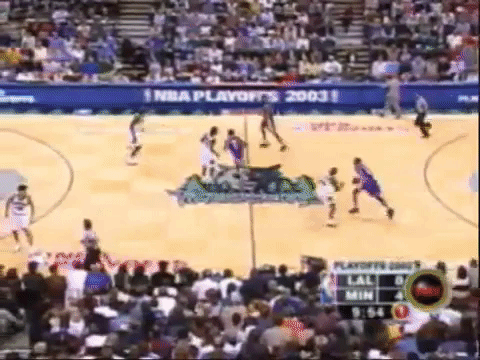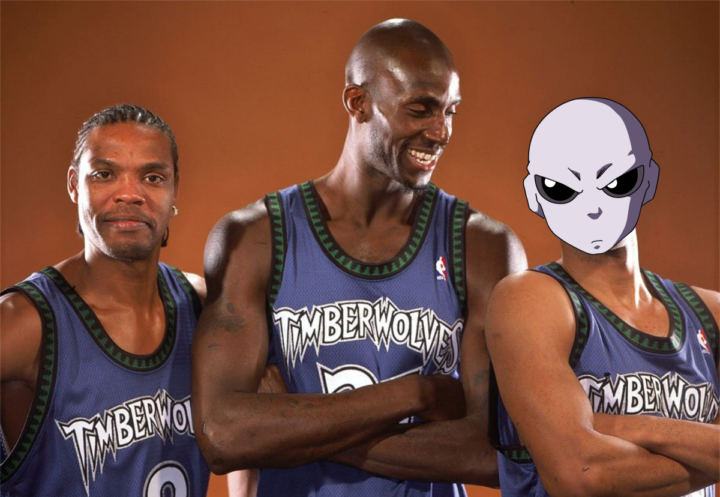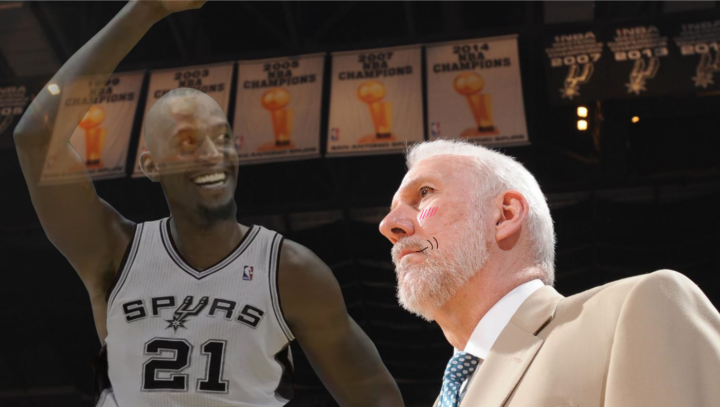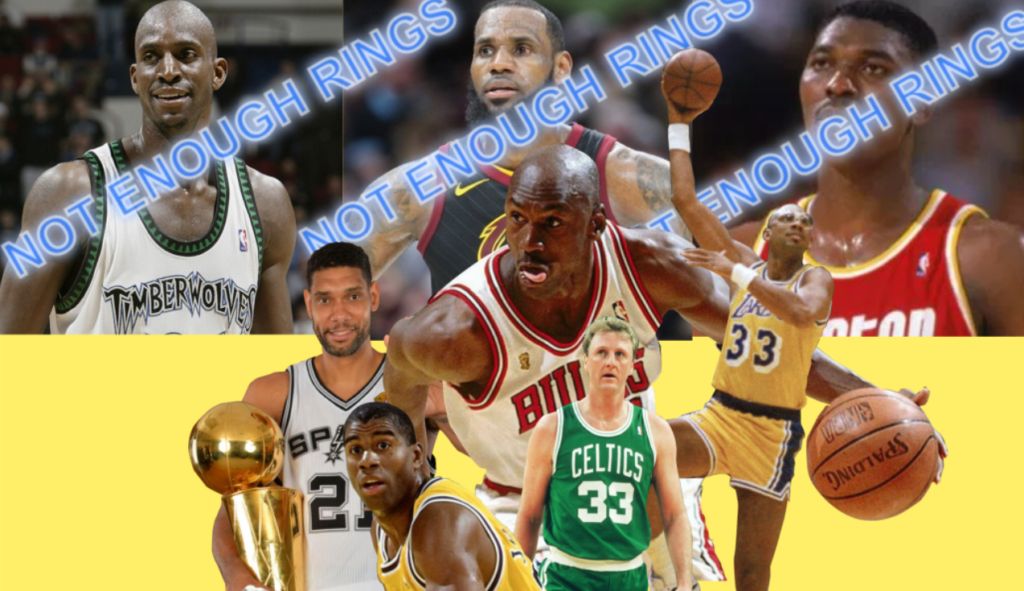Tim Duncan was a great basketball player. So was Kevin Garnett.
Tim Duncan was known for being an excellent 2-way player at the Power Forward position. So was Garnett.
Tim Duncan’s combination of potent defense, post scoring, and great passing and synergy is what separated him from other big men. The same applies to Kevin Garnett.
Tim Duncan has 5 rings. Garnett has 1 ring.

How come? Is it because Tim Duncan was the more skillful player? Well, their strengths were the same. In fact, when watching the footage, Kevin Garnett seems to be a lot more versatile, often guarding guys on the perimeter in a very effective manner due to his athleticism.
As a passer and overall synergistic player, Kevin Garnett seemed just as great, if not better than Tim Duncan. You can go by counting numbers, (in which KG averaged more assists than TD), film, and heck, even my word.
*In fact, in their primes, Kevin Garnett averaged more Points, Rebounds, Assists, and Steals and Tim Duncan did. The only counting stat that Tim Duncan excelled in was just Blocks. KG’s average win shares (if you are in to analytics) during the 10 year period of 1999-2008 was 13.97, to Tim Duncan’s 12.84. KG’s VORP and BPM were higher as well during that period.
From 2000 to 2009, Kevin Garnett’s average FG% was 47% from 10-16ft and 44% from 16 – 24ft, in comparison to Duncan’s 40.5% and 39.6%, respectively.

But those are just counting numbers. You see, the thing with critiquing players is that you can’t take counting numbers and accolades as the ONLY source for determining whose better than who. The reason why is because often times, a player’s individual talent and production only makes up a fraction of their overall career success. The other parts?
The supporting cast you have, the competition you play against, and the coaches you play with. So you don’t have to take those counting numbers I posted up above too seriously.
So yeah, Tim Duncan has 5 Rings to KG’s 1. Kevin Garnett has had 8 first round exits, including 7 straight at one point, while Duncan has only 4 (He actually only had 3, he missed the 2000 postseason to injury).
Is it because Tim Duncan was better? But what does better mean? As was already established, there wasn’t any notable skill gap between the two. So lets look at the other metrics discussed above: supporting cast, and competition and coaching.
The best roster Kevin Garnett played with prior to the Big 3 Boston Celtics was in 2004 with the Timberwolves. Who was on that roster you ask? Latrell Sprewell and Sam Cassell. I repeat, the best supporting cast he ever had in Minnesota was Latrell Sprewell and Sam Cassell. For one full year.
The best talent he had around him was one season of Latrell Sprewell and Sam Cassell fully healthy. Keep in mind, this season was Cassell’s first and only ever All-Star season, and first and only ever All-NBA. And guess what? Kevin Garnett had an MVP season on averages of 24/14/5/1.5/2, shooting 50% and 80% from the free throw line. KG took this team to the Western Conference finals and pushed the reloaded Lakers to 6 games, in a series where Sam Casell hurt his back, unfortunately. And that’s all he had with that team:

Latrell Sprewell turned down a contract extension the season after, and posted the worst season of his career. He was out of the league after 2005. Sam Casell was ravaged by injuries the next season and went from starting and playing 81 games in 2004 to starting only 38 games and playing a total of 59 games the year after. He subsequently was replaced by some dude named Marko Jarić.
If that’s not enough, look at what the Wolves accomplished after KG left. 13 seasons straight without making the playoffs.

Now lets look at Tim Duncan during the same period. Tim Duncan’s first 2 years in San Antonio saw him share the frontcourt with post-injury, past-his-prime but still-effective (especially defensively) David Robinson. There’s a reason why they were initially called the “Twin Towers”; Robinson averaged 18 points and 10 rebounds during his first 3 seasons with Duncan – which is actually really good when considering he was sharing the backcourt. Duncan, fresh out of college and NBA ready as ever, was averaging 22 and 12 in his first three seasons. So, that’s essentially 2 starting caliber centers. If that’s not enough, during his first three seasons with Duncan, Robinson was still making All-Star teams, and still was making All-NBA teams. All this when Duncan won his first ring in 1999.
The narrative that Robinson was “washed” really only applies to his last 3 seasons, where he averaged 12 and 8, and was firmly a role player in Timothy Duncan’s team. Duncan had a great carry job in 2003 – no doubt about it, he was excellent (and even then, the merits of this carry job are dubious). That’s not the point of this article. In fact, no, lets bring it up.
Compilation of Robinson and Duncan together shutting down the Knicks. Video courtesy of NobodyTouchesJordan on Youtube – subscribe to him, the dude has some great content.
Duncan’s teammates during this period (we’ll just say 1998-2004) were better than Garnett’s. They weren’t that great, but they were still better than what KG had. That’s a fact. Bowen, Jackson, and Ginobili (even as a young player) still formed a very solid perimeter defense in the 2002-2003 season. In fact, Bruce Bowen was ranked 7th in defensive win shares that season, Tony Parker was ranked 9th, and old man, washed up, past his prime, final-year-of-his-career David Robinson was ranked 14th. For players who played at least 60 games, David Robinson finished 2nd in Defensive Rating. Bowen ranked close behind him. Duncan had a very solid defensive supporting cast, which, given the slow-paced, low-scoring era at the time (teams averaged only 95 PPG, compared to 106 PPG today), presented a huge advantage.

None of Kevin Garnett’s supporting cast had defensive skill of that caliber.
Then you look at the playoffs. He played a weakened Lakers team that only managed a 5th seed that year. Keep in mind, this was the year that Shaq had surgery right before the season, thus letting the Lakers get off to slow start. This Lakers team struggled to make the playoffs. I know this sounds like nitpicking (because it is), but I’m using it to demonstrate why we shouldn’t simplify player rankings down to team success. If this was the Lakers team KG played in 2004 WCF, Garnett would have made the Finals that year.
Dirk Nowitzki and the Mavericks? Tim Duncan destroyed that matchup when he was healthy to his credit. Not that Dirk Nowitzki was known for being a great defender in the first place. But that’s nitpicky. The interesting thing to note is that Dirk got injured at the very end of Game 3, and Tim Duncan struggled afterwards. In the first 3 games of the series, he averaged 35. Then, afterwards, as Dallas went small, and employed a better mix of Zone and Man-to-Man schemes, his point average dropped to 21.
Is it worth mentioning the Nets? Who was guarding Tim Duncan in the finals? Keith Van Horn? The Nets had a 20th ranked offense that season. (I kid, I kid, I know this isn’t the best analysis).
In no way am I saying Duncan’s run wasn’t good. He was great. But it can’t be used as a way to grade him as better than KG.
So let’s zoom out. When you look at how Duncan’s supporting cast was, it’d make sense that Duncan playing individually great as he is would let San Antonio finish with better postseason results, which would guarantee a weaker first and second round opponent, thus giving Timmy deeper playoff runs with better stats due to him playing against worst competition for a larger percent of his runs.
It follows that the opposite would be the case for Kev. Kevin Garnett playing with a very weak supporting cast would prevent Kevin from leading his team to higher playoff seeds – instead, they’d finish low (6th-8th numerous times). Then they’d play a team with better talent than his right off the bat – such as the Lakers, Mavericks, and Tim Duncan’s Spurs. KG averaged 21.6 points in the playoffs from 1998-2010. Duncan averaged about 23 during the same time frame. This is with competition taken into account. And that’s huge. Because often times, the differences between what gives you a ring or not is down to individual talent only; the supporting casts and competition are huge, whether you want to admit it or not. It’s fun to talk about “willing a team to victory”, but the truth is, that’s not really the end of it. Swap out LeBron with Jordan on this year’s Cavs team. Let Jordan play with JR Smith, Kevin Love, Jordan Clarkson, and Larry Nance Jr. against the 2018 Warriors. He still loses.

Heck, Jordan lost in the 1980’s to the Celtics and Pistons. Did Jordan lose in 1988 or 1990 because he sucked compared to 1991? No, because the gap between his team and the Pistons shrunk. His co-stars in Pippen and Grant got more experienced and improved, and the Pistons were starting to decline.
As a result, KG’s playoff record is terrible compared to Tim Duncan – solely because of his supporting cast.
And the word “solely” is important here. Because the talent gap between Tim Duncan and Kevin Garnett was not very big. Look at them head-to-head in the playoffs. KG averaged 21.4/12/4/1/2, compared to Duncan’s 20.6/12/3/1/2.5.
Those numbers look pretty close. So why did the Spurs win 3-1 against them in the playoffs in 1999 and 2001? Talent and coaching discrepancy. Why did Tim Duncan dwarf Garnett in overall career success? The same reason.
If you think Duncan was better than KG, that’s fine. But the difference isn’t 5 rings to 1 ring.





